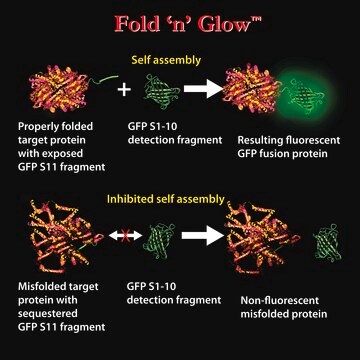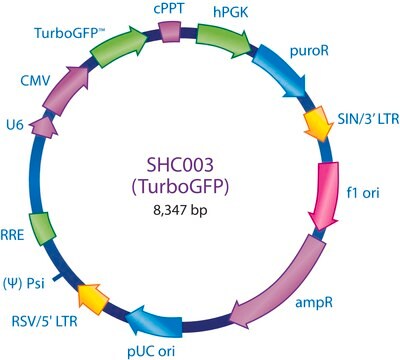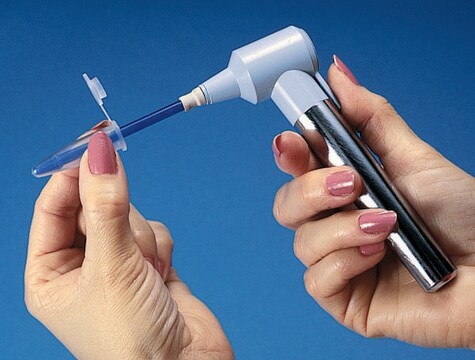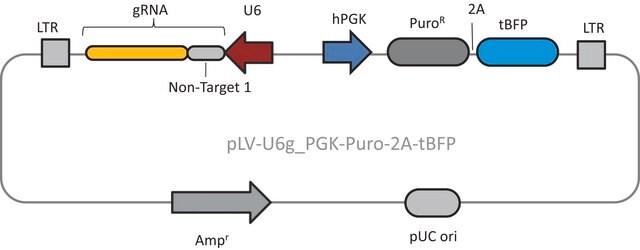APPA001
In Vitro Bacterial Split GFP Fold ′n′ Glow™ Solubility Assay Kit (green)
Se connecterpour consulter vos tarifs contractuels et ceux de votre entreprise/organisme
About This Item
Code UNSPSC :
12352204
Nomenclature NACRES :
NA.54
Produits recommandés
Technique(s)
protein expression: suitable
Niveau de qualité
Conditions d'expédition
dry ice
Température de stockage
−20°C
Application
The Fold ′n′ Glow Protein Solubility Assay kit allows a test protein to be expressed as an N-terminal fusion with a fluorescent protein [i.e., Green Fluorescent Protein (GFP), Cyan Fluorescent Protein (CFP), and Yellow Fluorescent Protein (YFP)]. This allows the detection of protein properly folded in a given sample as the folding reporter gives a signal directly proportional to the amount of correctly folded protein. The kit can be used for the detection and quantification of any protein by tagging and detecting either soluble or insoluble proteins.
Caractéristiques et avantages
Fluorescent protein (GFP, CFP, or YFP) fusions and split protein tags are widely used for the analysis of protein. These large tags can perturb protein solubility, misfold, and alter the processing of the protein. The split fluorescent protein technology used in the “Fold ′n′ Glow” assay overcomes these problems. The protein tag is a genetically encoded, split fluorescent protein technology, engineered with small, soluble, self-associating fragments. Thus, it is a simple split fluorescent protein system that doesn′t change fusion protein solubility, or require chemical ligation, fused interacting partners, co-expression, or co-refolding. Furthermore, while fluorogenic biarsenical FlaSH or ReASH substrates also overcome these limitations, they also require many other conditions not necessarywhen using the split fluorescent protein technology. Thefluorescent protein system is a simple and easy tagging and detection system. These kits may be used to quantify the expression level of the tagged protein, to determine the solubility of a protein, or to determine the solubility of a protein′s domain.
Adéquation
This kit contains sufficient reagents for one 96 well plate (96 tests)
Principe
The kit is a protein tagging and detection method that uses split fluorescent protein technology in a fluorescent complementation assay. The protein to be quantified is fused to a small fluorescent protein fragment (contained in the S11 plasmid) via a flexible linker. Expressed separately, neither the fusion protein of interest nor the fluorescent protein detector (Universal Detection Reagent S1-10) is fluorescent. When mixed, the properly folded fusion protein and detector spontaneously associate, completing the fluorophore. Misfolding or aggregation of the fusion protein makes the fluorescent protein tag inaccessible and prevents complementation, thus preventing fluorescence. Therefore, misfolded or aggregated proteins are not included in the quantification of the protein of interest.
Informations légales
Fold 'n' Glow is a trademark of Sandia BioTech
Code de la classe de stockage
10 - Combustible liquids
Point d'éclair (°F)
Not applicable
Point d'éclair (°C)
Not applicable
Certificats d'analyse (COA)
Recherchez un Certificats d'analyse (COA) en saisissant le numéro de lot du produit. Les numéros de lot figurent sur l'étiquette du produit après les mots "Lot" ou "Batch".
Déjà en possession de ce produit ?
Retrouvez la documentation relative aux produits que vous avez récemment achetés dans la Bibliothèque de documents.
G S Waldo et al.
Nature biotechnology, 17(7), 691-695 (1999-07-15)
Formation of the chromophore of green fluorescent protein (GFP) depends on the correct folding of the protein. We constructed a "folding reporter" vector, in which a test protein is expressed as an N-terminal fusion with GFP. Using a test panel
Stéphanie Cabantous et al.
Nature biotechnology, 23(1), 102-107 (2004-12-08)
Existing protein tagging and detection methods are powerful but have drawbacks. Split protein tags can perturb protein solubility or may not work in living cells. Green fluorescent protein (GFP) fusions can misfold or exhibit altered processing. Fluorogenic biarsenical FLaSH or
Notre équipe de scientifiques dispose d'une expérience dans tous les secteurs de la recherche, notamment en sciences de la vie, science des matériaux, synthèse chimique, chromatographie, analyse et dans de nombreux autres domaines..
Contacter notre Service technique





